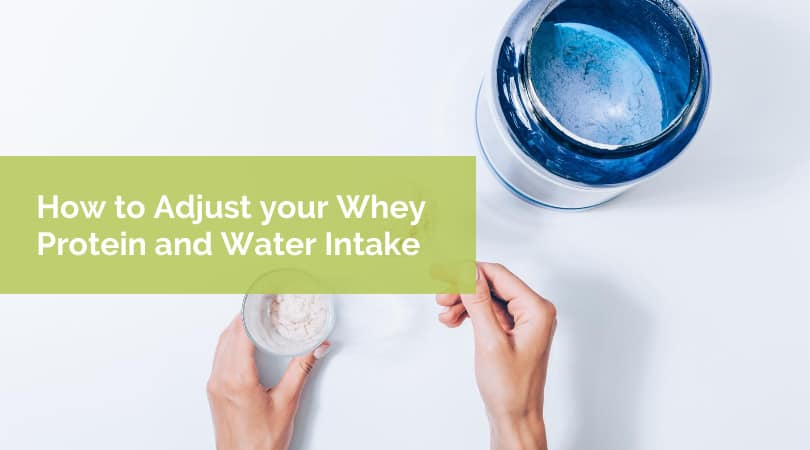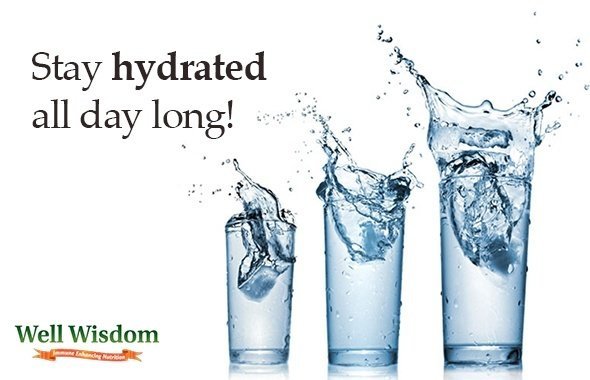 Introducing whey protein powder into your diet has been a major asset as you work towards obtaining your personal fitness or weight-loss goals. Consuming a good amount of protein daily is necessary if you are trying to increase your muscle mass. As your muscles begin to grow, your body fat will start to reduce as a result. Protein is the key to meeting your body composition goals.
Knowing the importance of protein, you have figured out how much whey protein per day you need to consume to help meet those body goals. But, what about water? Are you drinking enough water to support a higher protein diet?
Introducing whey protein powder into your diet has been a major asset as you work towards obtaining your personal fitness or weight-loss goals. Consuming a good amount of protein daily is necessary if you are trying to increase your muscle mass. As your muscles begin to grow, your body fat will start to reduce as a result. Protein is the key to meeting your body composition goals.
Knowing the importance of protein, you have figured out how much whey protein per day you need to consume to help meet those body goals. But, what about water? Are you drinking enough water to support a higher protein diet?
Guidelines for Whey Protein and Water Intake
Whey protein is a quick, convenient and easily digestible supplement that will provide you with a boost of extra protein that your diet may be lacking. A natural component of cow’s milk, whey protein is a great way to up your protein intake for it contains all nine of the essential amino acids, making it a “complete protein” like meat, dairy and eggs. But while whey protein has many benefits, it’s important to remember that high protein diets can cause dehydration. So, if you want to increase your whey protein intake you will need to increase water intake as well.Don’t increase protein without water
We are told time and time again to drink a minimum of eight 8-ounce glasses of water a day to keep hydrated. Once you start eating more protein, like whey protein, the amount of water will inevitably need to be increased. This is simply because your body will use up a lot more water as it works to metabolize the extra protein you are now consuming. As protein breaks down, it releases nitrogen, which cannot be allowed to build up in the body. Therefore, the kidneys need to be able to excrete the excess nitrogen. The kidneys work best when they have enough water to flush waste. Therefore, it’s important to consume a large quantity of water in order to rid the body of excess nitrogen, a side effect of a high protein diet.Consider your kidneys
[thrive_lead_lock id=’1912′] Some medical professionals show concern about the effects that a high protein diet can have on the kidneys. Simply put, if you up your protein intake, but neglect to increase the amount of water you consume, your blood urea nitrogen level (which is responsible for measuring kidney function) will rise as a result. For a healthy kidney that is getting enough water, this shouldn’t cause a significant problem or any kidney damage. The excess nitrogen or other wastes can be cleared naturally if the kidneys are able to do their job. High protein diets will also produce heavily concentrated urine as the body excretes the excess nitrogen. When urine is a deep yellow or has a strong smell, this is a clear sign of dehydration caused by the extra-fluids required to remove waste from the body.
And lastly, if you are on a high protein diet, whether you are using whey protein or you are simply eating a lot of natural protein, there is a small chance that you could develop kidney stones. This usually only occurs in people who are prone to kidney stones, but they are still an ordeal that no one wants to face. Again, drinking a lot of water may potentially help deter you from such a painful outcome.
High protein diets will also produce heavily concentrated urine as the body excretes the excess nitrogen. When urine is a deep yellow or has a strong smell, this is a clear sign of dehydration caused by the extra-fluids required to remove waste from the body.
And lastly, if you are on a high protein diet, whether you are using whey protein or you are simply eating a lot of natural protein, there is a small chance that you could develop kidney stones. This usually only occurs in people who are prone to kidney stones, but they are still an ordeal that no one wants to face. Again, drinking a lot of water may potentially help deter you from such a painful outcome.
 [/thrive_lead_lock]
[/thrive_lead_lock]
So how much water should we drink when consuming whey protein?
According to the University of Connecticut, people on high protein diets need to drink, on average, more than the 8-10 glasses compared to what is recommended for the average adult. Increasing your intake of water to at least half your body weight in pounds in ounces is a good place to start. This means if you weigh 160 pounds, you will need to drink at least 80 ounces of water per day. Pro Tip: If you are training and ingesting protein powder, your whey protein and water ratio should be at least 8 ounces of water every 30 minutes while you are exercising to keep your body hydrated. Be sure to always replace any fluid lost during exercise. You can figure out lost fluid by weighing yourself before and after. Drink 16 ounces of water for every pound you lose.Too much of a good thing
But remember, there can be too much of a good thing. Drinking too much water can actually have a harmful effect on the body, more is not always better. If you consume an excess amount of water it can cause low sodium levels and dilute your electrolytes. In extreme cases, it can lead to hyponatremia which causes seizures and even coma. If you want to increase your water intake, that is a healthy thing to do. But, don’t force water, always listen to your thirst signals. Half your body weight is more than enough to stay hydrated.Keep it balanced
If you do decide to bring whey protein into your diet, don’t forget to keep a water bottle full and at your side at all times so that you can be sure to stay hydrated all day long. Pro Tip: Whey protein and water can even be mixed together as a quick way to absorb protein into the body after a workout and there is a lot of variety to choose from. Whey Protein and Water
Now that you know how much whey protein you need per day and how much water you need; you are ready to select a protein powder. Many whey protein brands come in an assortment of flavors like chocolate, vanilla, banana, strawberry and mocha and they can all be mixed with water or blended with ice to create delicious and protein filled drinks, shakes and smoothies that will keep you full and hydrated. Start with your whey protein drink with water, add protein, then get creative by adding fruit, veggies, nut butters, or other flavorings. So if you are ready to build lean muscle and drop some body fat, you may want to consider introducing whey protein powder and water into your diet to keep your body strong and hydrated as you strive to achieve your personal best.Latest posts by Kade Brittain (see all)
- Persistent Tiredness and Chronic Fatigue: Causes and Symptoms - February 27, 2024
- Can A Protein Shake Replace A Breakfast Meal? - March 2, 2023
- Glutamine After Surgery: Does It Help With Recovery? - February 17, 2023






Thanks for giving me information about this.
This information is very helpful to me.
Thanks ❤️